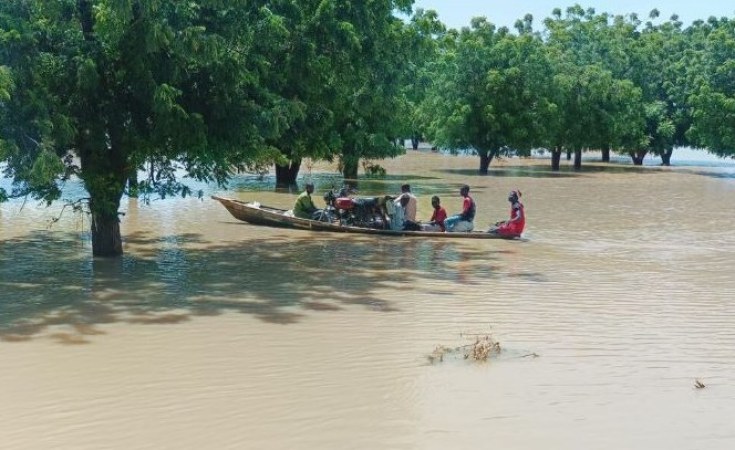Many countries in Africa suffer from disasters annually, but the adverse effects are grossly under-reported compared with coverage of more developed nations.
The impact of these disasters is also more severe in developing countries because they have less capacity to adapt and cope.
Flooding is the most widespread and recurrent disaster worldwide. In 2021 alone, flooding caused 4,393 deaths and US$137.7 billion in direct economic losses. Losses and deaths due to flooding have steadily increased over the years and will continue to rise if the current trajectory continues. In Africa, flooding is mostly caused by human factors. This includes poor spatial planning, lack of infrastructure and poor waste management.
The United Nations has called for global partnerships to achieve its sustainable development goals: no poverty, zero hunger, good health, quality education, sustainable cities and communities. Flooding has a direct negative impact on these goals.
In a recent paper I looked at how Ghana and Nigeria could work as partners on this issue.
These two West African countries are prone to flooding. Though they don't share a common boundary, they face similar issues in managing flooding disasters. Both have acknowledged their risks and have welcomed disaster risk reduction initiatives. They have both signed the Sendai Framework for Partnership on Disaster Risk Reduction.
My findings show a need to go back to the drawing board, given the severity and frequency of flooding, and to build capacity cooperatively.
The study identifies opportunities for cross-border cooperation geared towards finding solutions to problems that have similar root causes, especially among countries of similar profiles.
The cases of Nigeria and Ghana
Flooding in both Nigeria and Ghana is caused by a combination of two factors. The first is socio-political - unplanned urbanisation, inadequate drainage systems and waste management and poor physical planning. The second is changing climatic factors such as higher rainfall.
Nigeria is home to Africa's largest population (over 200 million). A significant proportion of the population is vulnerable to flooding. Annual flooding causes displacements and deaths, though precise figures are lacking.
Read more: Nigeria's floods are the worst in a decade. Here's how people try to cope with the devastation
Little has been done by the authorities to mitigate the hazard. This is clear from the fact that the country doesn't have a concrete policy on flooding or a national flood risk management framework. Addressing and reducing exposure to flood risk is listed as a national priority in the government's disaster risk-management agenda but no significant action has been taken.
Yet evidence suggests the flooding in Nigeria can be controlled through a suitable risk management strategy and implementation.
The absence of preventive action points to a lack of political will.
Another hindrance is a lack of co-ordination between bodies that are meant to deal with disasters. Take the National Emergency Management Agency, for instance. The law doesn't give it enough power to ensure integration among the different institutions working in flood risk management and disaster risk reduction.
Ghana has similar problems. Authorities have been blamed for not doing enough to mitigate recurrent flooding. The country's laws and policies concerned with flooding, like the Blue Agenda and the National Water Policy, have been criticised as inadequate and poorly implemented.
The National Water Policy is the primary programme aimed at integrating water-resources management. It encompasses measures directed at mitigating floods via early warning and establishing buffer zones. The Blue Agenda focuses on development control, public education, provision of drainage, and flood-control initiatives in urban communities.
But these policies have failed to achieve the desired results of adequately managing flood risk.
Collaboration offers a solution
The similar underlying drivers of flooding in Nigeria and Ghana present an opportunity for collaboration in research and data sharing. This could be in the areas of:
- assessing risks
- reporting procedures (perhaps involving citizen scientists)
- monitoring and warning services.
Others include improving flood risk and hazard information dissemination and building capabilities for mitigation and sustainable response strategies.
The countries could also collaborate to collect better flood data. Research is key to providing hydrological data, modelling information, flood warning, risk analysis, simulation, forecasting and adaptation.
Funding such intensive research will be more expensive for the two countries if they do it individually. Cooperation and sharing costs could free up resources for putting plans into practice.
Finally, institutional tools in the form of policies and legislation for managing flooding are poorly defined and deficient in both countries. It is important to co-operatively share data on exposures, vulnerabilities, and hazards. Such data can inform flood-risk assessment and response and enable both countries to learn from each other and previous mistakes.
A framework that outlines how the countries will work together would help to avoid any problems in sharing knowledge. Successful cooperation could set the path for the involvement of other West African countries that suffer flooding to work together, as has been done among some of the countries in the European Union.
Adaku Jane Echendu, Researcher, Queen's University, Ontario


